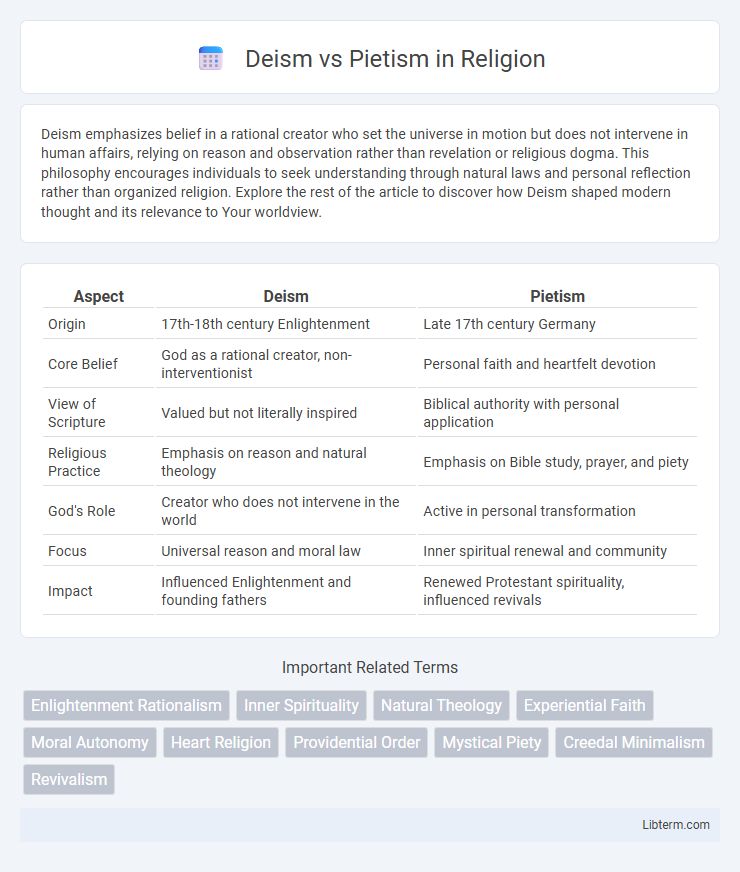Deism emphasizes belief in a rational creator who set the universe in motion but does not intervene in human affairs, relying on reason and observation rather than revelation or religious dogma. This philosophy encourages individuals to seek understanding through natural laws and personal reflection rather than organized religion. Explore the rest of the article to discover how Deism shaped modern thought and its relevance to Your worldview.
Table of Comparison
| Aspect | Deism | Pietism |
|---|---|---|
| Origin | 17th-18th century Enlightenment | Late 17th century Germany |
| Core Belief | God as a rational creator, non-interventionist | Personal faith and heartfelt devotion |
| View of Scripture | Valued but not literally inspired | Biblical authority with personal application |
| Religious Practice | Emphasis on reason and natural theology | Emphasis on Bible study, prayer, and piety |
| God's Role | Creator who does not intervene in the world | Active in personal transformation |
| Focus | Universal reason and moral law | Inner spiritual renewal and community |
| Impact | Influenced Enlightenment and founding fathers | Renewed Protestant spirituality, influenced revivals |
Introduction to Deism and Pietism
Deism emphasizes reason, natural theology, and the belief in a non-interventionist Creator, rejecting revealed religion and miracles. Pietism, emerging within Lutheranism, stresses personal faith, heartfelt devotion, and spiritual renewal through Bible study and piety. Both movements arose in the 17th and 18th centuries, shaping religious thought by contrasting rational belief and emotional experience.
Historical Origins and Context
Deism emerged in the 17th and 18th centuries during the Age of Enlightenment, emphasizing reason and natural theology as sources of religious understanding, rejecting supernatural revelations. Pietism arose in the late 17th century within German Lutheranism, focusing on personal faith, devotional practice, and moral living to revitalize established church traditions. These movements reflect contrasting responses to religious authority and spirituality amid the intellectual and social transformations of early modern Europe.
Core Beliefs of Deism
Deism centers on the belief in a rational Creator who designs the universe but does not intervene in human affairs, emphasizing reason and natural law over revealed religion. Core beliefs include the rejection of miracles, divine revelation, and organized worship, advocating instead for morality based on human reason and observation of the natural world. Deists uphold that ethical behavior arises from understanding the universe's order and that religious truths must be accessible through reason rather than scripture.
Core Tenets of Pietism
Pietism centers on personal piety, heartfelt devotion, and the transformation of the individual through a living faith expressed in daily life, emphasizing Bible study, prayer, and moral conduct. In contrast to Deism's reliance on reason and observation of the natural world, Pietism stresses experiential religion and the renewal of the Christian community. Key elements include small group fellowship, spiritual discipline, and active involvement in charitable works.
Key Differences in Theological Perspectives
Deism emphasizes reason and natural theology, rejecting divine revelation and miracles, whereas Pietism centers on personal religious experience, heartfelt devotion, and spiritual renewal within Christianity. Deism views God as a remote creator who does not intervene in human affairs, contrasting with Pietism's belief in an active, immanent God who guides believers through grace and sanctification. Theological perspectives diverge as Deism dismisses institutionalized religion, while Pietism promotes communal worship and moral reform.
Views on Religious Practice and Spirituality
Deism emphasizes reason and natural law, advocating for a rational approach to religious belief without reliance on revealed scripture or ritualistic practices, often rejecting organized worship and emotional spirituality. Pietism centers on personal faith, heartfelt devotion, and practical piety, encouraging small group meetings, Bible study, and a living faith that manifests in moral transformation and spiritual renewal. While Deism prioritizes intellectual understanding of God, Pietism stresses experiential spirituality and direct, personal communion with the divine.
Influence on Society and Culture
Deism shaped the Enlightenment era by promoting reason, scientific inquiry, and religious tolerance, fostering advancements in political philosophy and secular governance. Pietism emphasized personal faith, emotional devotion, and ethical living, significantly impacting Lutheran regions through social reforms and the development of community-oriented churches. Both movements influenced Western culture by encouraging individual spirituality while shaping distinct approaches to religion's role in public life.
Prominent Figures in Deism and Pietism
Prominent figures in Deism include Voltaire, Thomas Paine, and John Toland, who emphasized reason and natural religion over revelation. Pietism was led by figures such as Philipp Jakob Spener and August Hermann Francke, who focused on personal faith, devotional practice, and church reform. Both movements shaped religious thought during the Enlightenment but differed fundamentally in their approach to spirituality and theology.
Lasting Impact on Modern Religious Thought
Deism's emphasis on reason and natural theology significantly influenced the Enlightenment's promotion of rationalism in religious thought, fostering skepticism towards organized religion and divine revelation. Pietism contributed to modern evangelicalism by prioritizing personal faith, emotional experience, and devotional practices, shaping contemporary Protestant spirituality and revival movements. Together, these movements have left a lasting legacy, balancing intellectual inquiry with heartfelt piety in modern religious discourse.
Conclusion: Comparative Analysis
Deism emphasizes reason and natural theology, rejecting organized religion and revealed scripture, while Pietism centers on personal faith, heartfelt devotion, and experiential spirituality within Christian doctrine. Comparative analysis reveals Deism's reliance on rationalism contrasts sharply with Pietism's focus on emotional engagement and communal worship. This distinction highlights the broader epistemological divide between Enlightenment rational thought and the revivalist emphasis on individual spiritual transformation.
Deism Infographic

 libterm.com
libterm.com